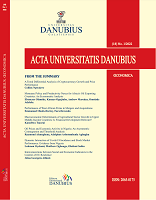The Effectiveness of Dynamic Monetary Policy Practices in Leading African Economies
The Effectiveness of Dynamic Monetary Policy Practices in Leading African Economies
Author(s): Mbongeni Zwelakhe Ngubane, Irrshad Kaseeram, Brian T. MazorodzeSubject(s): National Economy, Economic policy, Developing nations, Financial Markets
Published by: Editura Universitară Danubius
Keywords: ARDL Model; Taylor Rule; Inflation Targeting;
Summary/Abstract: The effectiveness of the monetary policy in leading African economies categorized as inflation-targeting markets (SA and Ghana) and non-targeting markets (Nigeria, Kenya, and Egypt) in the post-Global financial crisis era is compared in this study. The sampling period stretched from 2007Q1 to 2020Q4. The study estimated the augmented Taylor rule for a small open economy using the autoregressive distributed lags (ARDL) model necessitated by the mixed integration of variables. The results indicate that there is heterogeneity among the inflation-targeting economies because only the South African monetary system could be explained using the Augmented Taylor rule. Contrarily, Ghana’s results move with the motion that inflation targeting is not for the lower income countries. Secondly, the policy rates react to exchange rates directly in the short-run for all economies, except South Africa. This indication shows that most emerging markets in Africa show fear of float when it comes to exchange rates system which denotes a lack of a vibrant monetary policy system. Selected emerging market economies regarded as non-inflation targeting markets are fit to adopt inflation targeting but still require a sophisticated financial system. Again they (including Ghana) should move away from the fear of floating phenomena to avoid issues of conflict of interest.
Journal: Acta Universitatis Danubius. Œconomica
- Issue Year: 19/2023
- Issue No: 1
- Page Range: 59-79
- Page Count: 21
- Language: English

